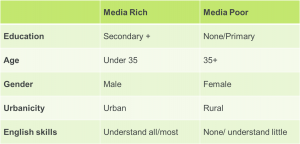Nigeria: mobile rises sharply while radio dominates for news
WASHINGTON (May 15, 2014) — While a vast divide remains between “media rich” and “media poor” Nigerians, household mobile ownership has surpassed that of radio and TV in Nigeria, and the use of Internet is trending upward, according to new findings on Nigerian media consumption habits presented today by the Broadcasting Board of Governors.
The data, which comes from a national media survey conducted by Gallup in early 2014, shows that 87% of Nigerian adults have a mobile phone in their household. Personal mobile phone ownership has grown across all demographics, including women, Hausa speakers, and older Nigerians.
Home Internet access also increased sharply–nearly tripling from 7.5% in 2012 to 22.9% in 2014. This growth is directly linked to the continued spread of mobile technology, as 95.7% of weekly Internet users say they accessed the Web using a mobile device. However, the spike in new Internet users consists largely of men and those in the 15-24 age bracket.
While use of new technologies is on the rise, radio remains the dominant news platform in Nigeria, with 77.4% overall and more than seven in 10 across all major demographic groups saying they listen to the radio for news at least weekly.
“Hausa speakers are still the most avid radio listeners, but trail behind on other platforms,” said Sonja Gloeckle, research analyst at the International Broadcasting Bureau.
Nigerians are active consumers of news, with two-thirds (66.6%) saying they access news at least once a day. At the same time, Gallup World Poll data from July 2013 found a sharp decline in perceptions of media freedom in Nigeria, particularly in the north.
Dan Foy, consultant at Gallup, explained that perceptions of a functional democracy were low in Nigeria. “Just 18% of Nigerians have confidence in their country’s elections,” he said, “and only 30.4% have confidence in the government that those elections produce.”
A research brief and presentation with further information about this data can be found here, and a recording of the briefing will be added in the coming days. More information about the BBG’s media research series is available here.

